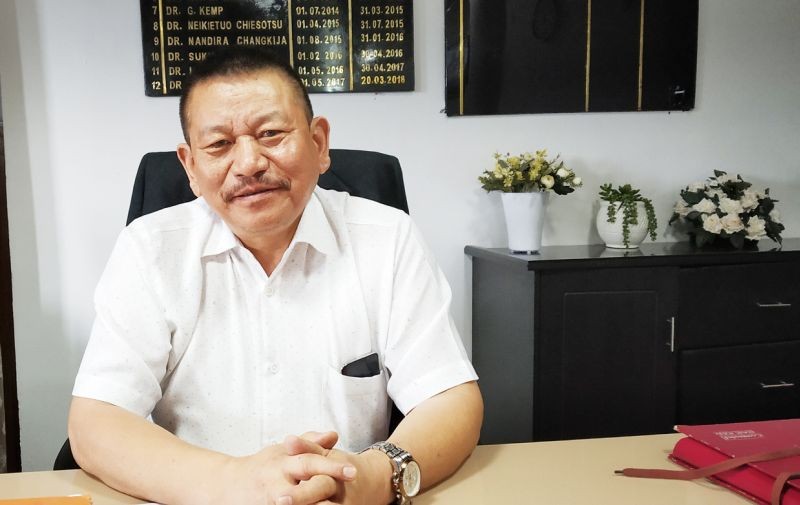Nagaland Principal Director for Health and Family Welfare, Dr Vizolie Suokhrie. (Morung Photo)

Atono Tsükrü Kense
Kohima | January 21
While the COVID-19 pandemic has unmasked Nagaland’s pitiable health care system, it has also served as a catalyst for much needed transformation by propelling both the government and the department to make expeditious amends in response to the pandemic.
Now, the challenge is to build the momentum of ‘reformation and transformation’ in the health care sector to deliver better health care services and also build a resilient health care system for any potential waves of epidemics and pandemics.
In an exclusive interview with The Morung Express, Principal Director for Health & Family Welfare, Dr Vizolie Suokhrie spoke about strengthening and improving the health care system in the State.
Being prepared
“This pandemic has been a learning experience. In fact, this pandemic has taught us that we must be ready and prepared all the time as we do not know what pandemic will come in some years,” said Dr Suokhrie.
He stated that a robust health care system is even more important that a strong defense system. He added that “there’s no point thinking about the economy without putting the health care system in place.”
Dr Suokhrie said that the department is working towards filling the gaps in this sector and expressed confidence that the government would continue to support them.
Signs of progress
The pathetic conditions of the district hospitals across Nagaland were exposed during the preparation to convert the hospitals into COVID Hospitals. The lack of ICUs and even basic diagnostic equipments and amenities were stark reminders of the state of Nagaland’s district hospitals.
“Today, we are happy that most of the district hospitals have become presentable with basic structural and diagnostic facilities,” said Dr Suokhrie adding that all the district hospitals are much better equipped. He, however, conceded that there still remains a lot more to be done.
In response to the pandemic, he appreciated the State Government for its support despite the many constraints for bringing positive changes in the health care units. “We could at least make ICUs functional in all the district hospitals, which was never like this before with functional X-rays and ultrasounds,” the Principal Director noted.
He further informed that there is a medical specialist in each district hospital now and very soon oxygen generation hospitals would be a reality. “We can comfortable say that for the first time all the district hospitals have become First Referral Units (FRU),” he added.
Highlighting the ongoing projects under the National Health Project (NHP), Dr Suokhrie said repairing and renovation of all the Community Health Centres (CHCs) across the State, 50 Primary Health Centres (PHCs) and 90 sub-centres are on the verge of completion except for NHAK and Peren District Hospital. This, he said has come in very handy in response to the pandemic.
While projects undertaken under NHM for Mon, Kiphire and Phek have completed, works at the Dimapur District Hospital is in progress. “The work is progressing very fast and we hope to close the project at the earliest,” he stated.
He further informed that the NHM project in Mokokchung is also ongoing and sanction for Longleng was received recently. He expressed confidence that approval for projects under the North East Special Infrastructure Development Scheme (NESIDS) for the district hospitals would also be received soon.
Dr Suokhrie further informed all the health units in the State are ready with waste management facilities with trained personnel.
Constant improvement needed
Despite these positive developments, when asked if the State is prepared to deal with future potential epidemics or pandemics, the Principal Director expressed: “I cannot say we are fully prepared but we are well prepared now.”
“With this experience, we learnt that we have to keep on improving our health system,” he stated and lauded the response of health workers across the state. “Despite all the constraints, everyone has prepared and given their best and this time people must have realised that our health workers are second to none,” he said.
“If we continue to work and respond like this, I think we can transform our health care system and face any type of situation,” Dr Suokhrie confidently put across.
While the department has been asking for more manpower for the last two decades, Dr Suokhrie appreciated the government’s quick response in approving 390 new sanctioned posts which he termed as a “wonderful gesture and encouragement to the medical fraternity.’
When enquired on the next step for the Health Department and its employees, Dr Suokhrie’s call to his subordinates was “now is the time for us to deliver.”
“Like the way we have shown our unity, dedication, punctuality and regularity in work place, we must continue with the same spirit. We need to keep growing and improving. Only then, the people as well as the government will build their trust on us,” he stated.
Dr Suokhrie called for supporting each other to overcome any situation and deliver better services to the people.






